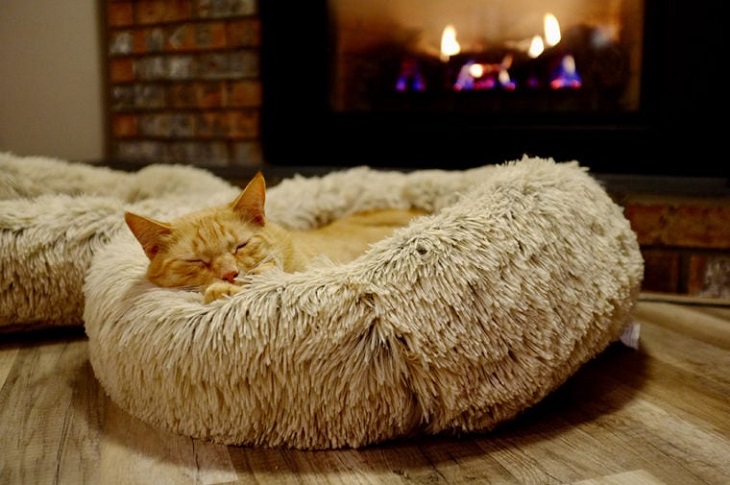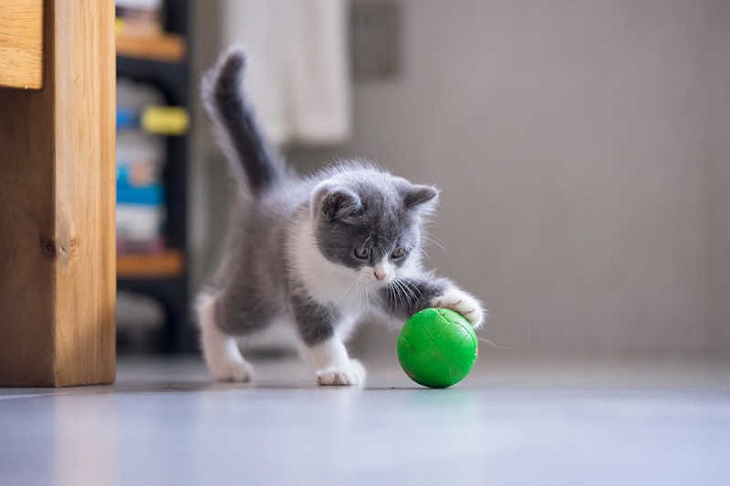Being a cat owner isn’t always fun. Just like humans, cats also experience mood changes that can show off as aggression, overly clingy behaviour, meowing more than usual, coat changes, etc. All these symptoms scream for help. You need to recognise the signs as soon as possible and provide the necessary support.
These changes may imply a lot of things such as providing a pleasant environment, changing your cat’s diet or in some cases including some medicine treatment. Alleviating the symptoms will make your cat return to its natural homeostasis and remain calm and playful gain. If you have trouble deciding which steps to take we offer simple solutions to help you with your questions regarding your cat’s anxiety so you may gain better insights into what works best for your feline friend.
Infuse Your Space With Harmony with a Cat Calming Diffuser

Cats aren’t any different than humans when it comes to experiencing different feelings and emotions. Although they are unable to express themselves vocally their underlying emotions come to the surface through their behaviour. However, anxiety in them can be easily detected. This often includes signs of agitation, unusual withdrawn behaviour such as a reduced desire to play and interact, changes in appetite, urinating outside the litter box, showing signs of lethargy or changes related to travelling, adopting to a new home etc.
Creating a calming and stress-free environment for your pet can make all the difference to its brain. One way is to include a cat calming diffuser in your space. You are probably familiar with the simple term diffuser and how it works. You simply plug it in a plug socket the same way you would an air freshener.
Cat pheromone diffusers are specially designed to copy the exact facial pheromone that felines leave naturally when they rub their cheek against an object or people when they feel comfortable and at ease. When the animal detects these pheromones they will immediately start to regain their sense of comfort, relaxation and familiarity.
Feliway is one such cat-calming diffuser that is recommended for the relief of anxiety in felines, enabling reactions to stressful situations to be controlled and avoided. This cat calming diffuser is recommended by veterinarians worldwide due to its specific properties which many pet owners find especially helpful. One bottle can usually cover an area of up to 70m2. Make sure you plug it in areas where your furball spends most of the time and where its usual inappropriate behaviour occurs. Avoid placing it behind bigger pieces of furniture where its effects can be obstructed.
For many cats, anxiety diffusers can work magic by providing a sense of security and calm, however, their effectiveness may not be as good for others. Therefore you need to consider some other options such as making some changes by providing enough stimulation in an environment that has a homey and cozy feel.
Provide a Stimulating and Comfortable Environment

Have you ever noticed your feline gazing out the window watching you head off for a hike on a sunny day, while you leave it behind with having nothing to do? Well, for indoor cats this could be the reason why they start to act off in strange ways. Just as little kids require a playground to be themselves cats also need something to stimulate their playfulness and alleviate their sense of boredom. Therefore, you need to enrich your feline’s life by providing an engaging and at the same time comfortable space to live.
As felines like to curl up in balls and have their naps more time during the day providing them with a cosy and warm spot to rest is a must. By having a comfortable place to sleep and rest your pet will feel safe and calm. Besides this, cats also need mental stimulation. They want to run, jump, play around, catch toys and have fun. For this simple reason, you may consider placing a dozen feline-friendly furniture pieces, such as shelves, climbing towers, and napping nooks where your cat can perch off and play around to not get bored.
Make Sure Your Feline Gets Enough Playtime

Although providing the right environment seems to solve a big part of the problem, your cat will still need your attention. By making a habit of playing with your cat regularly you can start to notice the anxiety symptoms in your cat decrease and your cat become happier, and healthier both mentally and physically.
Since exercise is known to release feel-good hormones in the human brain the same feature applies to cats. By engaging in regular activities the animal’s body starts to naturally fight the symptoms of anxiety, so make sure you keep it busy. Look for toys your ball of fluff wants to play around with. For instance, these may include small stuffed animals as they enjoy carrying things around, wand toys that act like prey, scratchers, and card boxes that will give them the required playground they long for.
Cats are keen to show their playfulness and funny side when they are given the right environment so get on your feet and engage your feline in play sessions such as jumping, chasing, and pouncing that will allow your cat to release the excess stress and energy it carries and express its natural hunting instinct. Besides having a fun time with your pet can enhance your mutual bond and help your relationship grow stronger.
Moreover, the simple act of engaging with your furball has mutual benefits. Each day you set time aside to play you will be rewarded with laughs helping you cherish those unforgettable moments together.
Changing Your Cat’s Diet
All these solutions seem helpful, but let’s not forget one crucial factor, diet. Diet plays an enormous role in all living beings on the planet including your cat’s mental and physical wellness. If you start to notice behavioural changes in your pet, it may be time to review its complete health by taking it to a vet. More often these regular checkups uncover insufficiency of substantial nutrients and vitamins lacking in your cat’s body. This means you may need to consider enriching or completely changing your pet’s diet for a certain period.
A whole food diet is known to provide your feline with all the vitamins and minerals for optimal health which compared to consuming processed food or food high in carbs and sugars can rob its body of its energy including feelings of lethargy, stress, and developing overall obesity in indoor cats. Moreover, poor quality food creates inflammations in the body, which if persist to be chronic can be the precursor for developing some diseases and increase anxiety.
Include a Specific Anti-Anxiety Medication Therapy
Although this may be the last option for your cat’s low moods and anxiety symptoms, it isn’t entirely excluded as some will benefit from being on medicine therapy as a way to boost their moods and give them the necessary help. Being equipped with cat medication can help but this isn’t always enough as you also need to know which medicines may help your cat with its anxiety problems. For this reason, getting professional help will be the best solution for your feline buddy.
First of all your veterinarian needs to examine your cat’s overall health to make sure there aren’t some underlying issues before starting the medical treatment. Different types of anti-anxiety meds can be prescribed such as Fluoxetine, Paroxetine, Sertraline, Lorazepam, etc. All of these are meant to be taken daily usually for three up to six weeks to take full effect on the body. Once your cat’s behaviour stabilises, the medications should be gradually reduced so the animal’s brain can start to naturally fight off the feeling of anxiety and low moods.



















